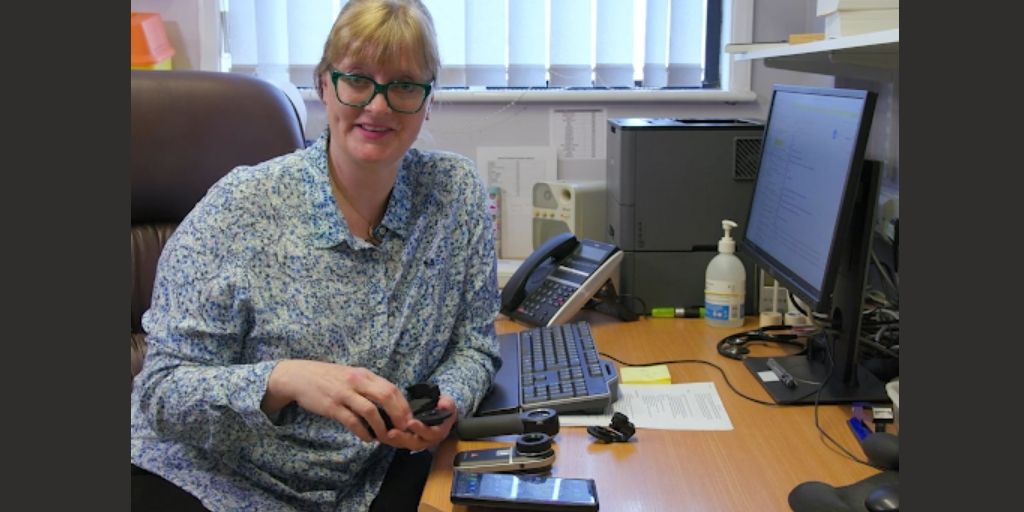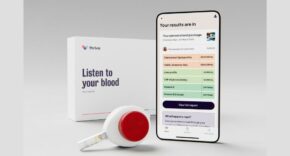
North West England – A suite of new teledermatology technology has been rolled out across Cheshire & Merseyside, as part of an ICS-led initiative to streamline the triaging and referral of dermatology patients.
With backlogs and record service demand placing high pressure on the region’s primary and secondary care services, this initiative has been launched by the Cheshire & Merseyside ICS and 4 Acute Trusts in Liverpool, Wirral, and Cheshire (including Liverpool University Hospital NHS Foundation Trust) to support 228 GP practices in the delivery of timely, effective and collaborative dermatology care.
Made possible by National Teledermatology Investment Programme (NTIP) funding and a partnership with Cinapsis SmartReferrals, the powerfully simple solution consists of a smartphone-compatible Dermatoscope, a connected app and integrated digital platform.
How it works
The 228 participating GP practices have all been provided with Heine dermatoscopes, with a universal adaptor that attaches to any smartphone camera
GPs are able to use their own phones to safely capture high-quality clinical images of moles and other skin lesions in a data-compliant manner
These images can be easily attached to dermatology referrals or Advice & Guidance requests made through the Cinapsis SmartReferrals app
On the Cinapsis desktop or mobile platform, a secondary care specialist is able to review the case and suggest the best course of treatment or next steps for the patient – whether that be an outpatient clinic appointment, primary care management or self-care
The images, and the outcomes of the referral or advice & guidance, are automatically updated in the patient record via an NHS ERS and EMIS integration
A key advantage of this initiative is that it is reducing the (previously high) number of benign moles and skin lesions being referred into secondary care via the Two Week Wait (2WW) cancer pathway. This was not only a drain on resources, but was causing needless worry for thousands of patients.
Prior to the technology roll-out:
30% of dermatology 2WW referrals were being referred unnecessarily.
This was amounting to approximately 7,000 unnecessary referrals every year, at a cost of over £1 million.
However, since the Cinapsis technology and services were launched in the region:
49% of cases submitted on the platform are successfully managed with advice and guidance alone
All patients entering the cancer suspected, two-week wait pathway are correctly referred
Patients who do have clinically worrying lesions are being redirected into the appropriate clinic earlier on, whilst those with benign lesions are screened out and need not make the journey to hospital.
Clinician resources are being freed up to tackle wait times for other dermatological conditions, such as the inflammatory dermatoses
Dr Stephanie Gallard, GP & Primary Care Lead for Elective Dermatology within Cheshire and Merseyside Health & Care Partnership, said:
“Historically, my GP colleagues and I had to waste hours wrestling with clunky, poorly-integrated photo-sharing technologies if we were able to attach photos at all in a data compliant manner. Aside from the heavy burden it was placing on our time, this was leading too many dermatology referrals to be made without high-quality images. This meant that patients were often called in for a face-to-face specialist appointment when they did not need special treatment, or when they could have been more appropriately managed in primary care.
“Now that I can use the Cinapsis SmartReferrals platform to manage patient referrals and access specialist second-opinions within days, I’ve been able to work more efficiently and treat patients more effectively. The entire referral process is now faster and more accurate: this means that my patients recieve the right care, first time around. Because all the information and actions are automatically synced to the ERS, it’s easy for me to monitor the patient’s condition and make sure that nothing slips through the net.”
Dr Richard Azurdia, Consultant Dermatologist at Liverpool University Hospitals NHS Foundation Trust, said:
“As a Consultant Dermatologist, receiving high-quality images attached to every patient referral and advice & guidance is incredibly helpful. I can quickly review all the necessary information and make an informed, collaborative decision with the referring GP. – without the endless email chains.
“With the Cinapsis SmartReferrals platform available on my phone, laptop, iPad and PC, I can manage all referrals and requests through a single, integrated interface – whether in my office or on the wards. The APP system is simple but effective and can be adapted in a bespoke way for local service nuances. This is saving me time that I can put towards helping patients and reducing care backlogs.”
Paul McGovern, Elective Care Programme Manager at Cheshire and Merseyside Health and Care Partnership said:
“This technology roll-out is the product of two years’ worth of planning and trials; several solutions were rigorously tested before the ICS team settled on Cinapsis SmartReferrals as selected as the most impactful teledermatology solution.
“The resource commitment and genuine partnership approach taken by Cinapsis has been first-class, enabling us to build a proof-of-concept model within the Liverpool area, secure further investment, then take the project forward across the City and into neighbouring CCGs within the ICS model.”
Dr Owain Rhys Hughes, founder & CEO of Cinapsis, said:
“As a surgeon with over 20 years of experience, I know exactly how important streamlined communication is to the delivery of the NHS’s world-class patient care. That’s why the Cinapsis team has worked very closely with the Clinical Leads and the Teledermatology Programme team in Cheshire and Merseyside to build this bespoke, tailored solution.
“We’re passionate about delivering technologies that save time for clinicians, save money for the NHS, and ultimately could save patients’ lives. This partnership will make collaborative working between primary and secondary care teams a reality, and Cinapsis is proud to be playing a part in that.”












